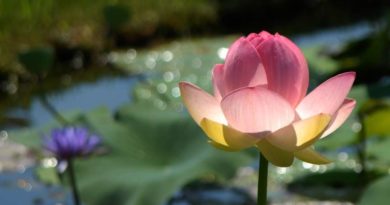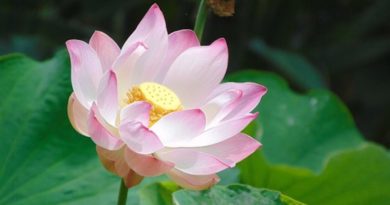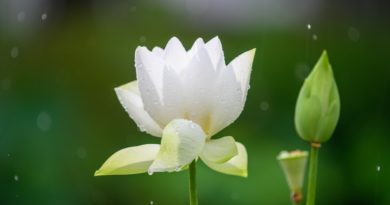DHAMMA PADETHA – 5. LET THE BODY SUFFER, NOT THE MIND
DHAMMA PADETHA – LET THE BODY SUFFER, NOT THE MIND
Once, Lord Buddha was residing in a sanctuary for animals at Susumaragira town in Bhagga country. During that time, a very old man from Susumaragira came to the Lord Buddha. He was called Nakulapita, a rich man.
This rich man had won an etadagga title as the foremost in being closely acquainted with Lord Buddha. He always went to pay homage to the Lord Buddha.
At that time, he was too old and had become weak so that he kept suffering from ailments. He was no more in good health. In future he would not be able to pay homage to Lord Buddha. He would go just once while he could. He would request the Lord to give him an admonition which would benefit him for long. Thus, thinking he approached the Lord Buddha.
After paying obeisance he asked the Lord Buddha to give him a dhamma discourse “O Lord, I have reached the last stage of my life and have become too old. I do not have good health even for a moment, I keep suffering from many diseases. It will not be easy for me to come another time. Therefore, please give me an admonition which will be beneficial for long.
Lord Buddha replied “It is true that you are no more healthy because of old age. However, there is no one who has no ailments and is always healthy. Everyone has ailments. Those who say they do not have any disease are those who do not know or are fools.
After that, Lord Buddha gave the rich man, the most suitable discourse ‘Rich man, let your body suffer, not the mind. Practise, so that the mind does not suffer.”
The rich man having listened to the most suitable discourse bowed down most respectfully with his hands clasped and went round Lord Buddha from the right side clockwise and departed after paying respects. Each time the rich man went to Lord Buddha, he also went to Ashin Sariputta to pay obeisance.
Ashin Sariputta addressed the rich man ‘You look very bright and pleasant, did the Lord give you any dhamma discourse?’ He answered, ‘Why wouldn’t the Lord give a dhamma discourse to a person like me? He had given me admonition.
When Ashin Sariputta asked what kind of discourse the Lord had given him, the rich man answered ‘Let your body suffer not the mind. Practise, so that your mind will not suffer.’
Ashin Sariputta was Buddhas chief disciple, who had been given etadagga title for his wisdom. As soon as he heard what the rich man said, he realized that the nature of suffering in body and mind, as well as, only the body suffering and not the mind should be distinctly clarified. Lord Buddha should be asked this question.
Seeing this, the rich man was asked, whether he had requested the Lord to tell him how to practise so that body and mind suffer and how to practise so that only the body suffer and not the mind.
The rich man replied, Venerable Sir, I did not request the Buddha to tell me how to practise I will only know if you instruct me how to practise so that both body and mind suffer, and only the body suffers not the mind. It will not be easy for me to come another time. So please instruct me, Venerable Sir.’
Ashin Sariputta elaborated the twenty kinds of false view of self (attaditthi). If one is attached to the body and mind together, then both the body and mind suffer.
For example. when one’s palm or sole is pierced by a thorn while working and there is no pin to take it out, one finds another thorn to take out the first thorn but the first thorn does not come out. Instead, the second thorn is left broken in the flesh. That person has to suffer the two thorns piercing the flesh. Similarly, those who cannot meditate and discern the body from the mind, suffer both in body and mind.
If one can practise meditation and know that the body is separate and the mind that knows is separate, only the body suffers and not the mind. This was the dhamma discourse given by Ashin Sariputta.
Motto: If attached to the body and mind both the body and mind suffer. If one notes the process of the phenomena of the body and mind as they arise and pass away, only the body suffers, not the mind.
Those who practise meditation and reach knowledge of dissolution (bhanga nana), as they note intently when pain arises in the body they will realize that the pain disappears one note after another. Because one notes attentively and knows the passing away only the body suffers, not the mind.
Consequently, Lord Buddha had instructed that one must practise meditation so that only the body will suffer, not the mind. (Sam 2/1)









